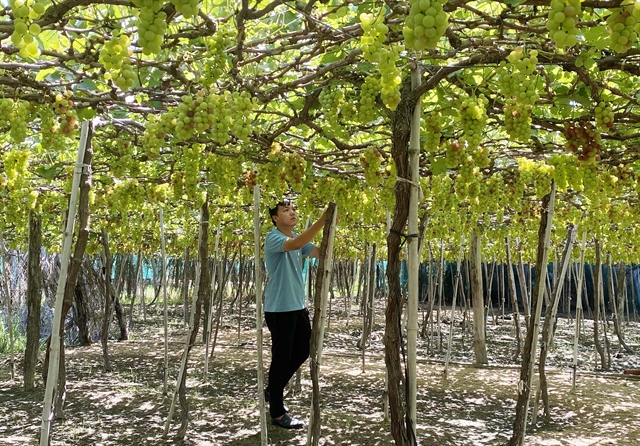 Economy
Economy

The boom of the fourth industrial revolution, increasing competition pressure and rapid international integration were raising a pressing need for the collective economic sector to make changes, cooperate with each other to expand production, enhance efficiency and improve competitiveness for sustainable development.

|
| Evergreen Ninh Thuận Grape Cooperative in Phan Rang - Tháp Chàm City. The focus of the support for cooperatives should be on helping them to expand scale, increase production efficiency, and competitiveness and move towards sustainable development. — VNA/VNS Photo Công Thử |
HÀ NỘI — The collective and cooperative economic sector needs support policies to overcome challenges from the fast-changing world and create breakthrough development, experts have said.
Deputy Minister of Planning and Investment, Đỗ Thành Trung, said the collective economic sector was faced with a number of problems.
These included internal problems such as poor socio-economic conditions of members, weak qualifications and capacity of staff, and outdated infrastructure and technology.
Cooperatives also faced difficulties in accessing the Government's support in capital, land, technology, and market.
The boom of the fourth industrial revolution, increasing competitive pressure, and rapid international integration are raising a pressing need for the collective economic sector to make changes, cooperate with each other to expand production, enhance efficiency, and improve competitiveness for sustainable development, he said.
According to Nguyễn Thị Tuyết Minh, Director of the German Cooperative and Raiffeisen Confederation (DGRV), the support for cooperatives in the early stages of foundation plays a very important role in the future development of cooperatives.
Support policies should be understood as specific provisions integrated into the law, with consistency in application to create conditions for cooperatives to fully participate in the economy.
Additionally, cooperatives should be allowed to participate in support programmes for other types of businesses when they meet the requirements, she said.
An important solution is to create a suitable legal framework for cooperatives to access credit, which would serve as financial leverage to expand their production and business, without eliminating the basic principles of the cooperative model, especially the principle of self-reliance, Minh added.
Minh said the focus of the support should be on helping cooperatives to expand in scale, increase production efficiency, competitiveness, and move towards sustainable development.
Mai Quang Vinh, General Director of the Việt Nam Digital Economy Cooperatives Alliance, said that without the Government's support and a long-term vision, cooperatives with the bottleneck of limited management skills and resources would struggle to achieve breakthrough development.
According to Trung, the experience of countries around the world showed that public-private partnerships played an important role in the development of cooperatives. He pointed out that banking and financial institutions should be encouraged to invest heavily in cooperatives, especially in machinery, technology, and in finding markets for products of cooperatives.
The Cooperative Law 2023, which was passed in June and will take effect from July 1, 2024, is expected to pave the way for promoting the development of the collective economic sector in the new context.
The Ministry of Planning and Investment is in charge of developing detailed instructions to implement this law, Trung said, adding that the focus would be on improving the legal framework to create favourable conditions for cooperatives and enable them to access the Government's support and develop sustainably.
Statistics from the Việt Nam Cooperative Alliance showed that there are more than 29,000 cooperatives in Việt Nam, 70 per cent of which operate in agriculture. Cooperatives attract around 6.4 million members, have a total chartered capital of VNĐ54 trillion, or VNĐ1.86 billion each, and total assets of VNĐ187.75 trillion or VNĐ6.5 billion each.
There are also 125 cooperative alliances with an average revenue of VNĐ258 billion per year and an average profit of VNĐ8.9 billion.— VNS




